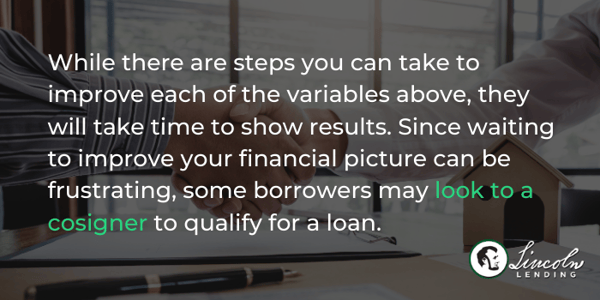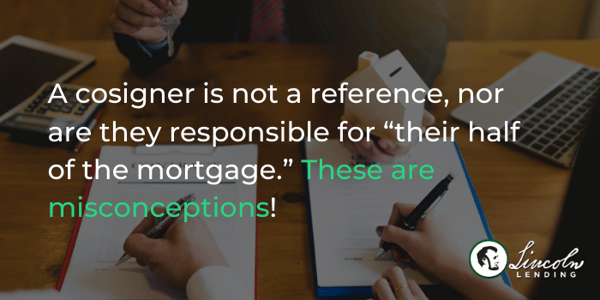Homeownership is not a decision to take lightly, and the situation can become even more precarious when a cosigner is involved.
While a cosigner may seem like a great idea – allowing you to purchase the home of your dreams – it can create a misleading picture of your financial situation and possibly damage a valued relationship. So, before you or your loved one signs on the dotted line, let’s take a hard look at the reality of having a cosigner on your mortgage.
Mortgage Approval 101
Though some financial planners advocate for purchasing a home in cash, this is not realistic for most people. In fact, in June of 2019, only 16% of homes were purchased in cash.
With this in mind, nearly every homebuyer will undergo the process of applying for a mortgage. Lenders assess mortgage applications on three main criteria:
- Credit report and score
- Debt-to-income ratio
- Cash to close
Since your history of on-time payments impacts your credit score, lenders typically used it as a predictor of how reliably you pay your bills. Debt-to-income ratio is used to determine whether you can afford monthly payments.
Cash to close is the amount of money you have saved up for down payment plus closing costs. Most loan programs have a minimum down payment. You will also need to be prepared for closing costs (e.g. title fees, taxes, insurance, lender fees, appraisal, inspections, etc.).
While there are steps you can take to improve each of the variables above, they will take time to show results. Since waiting to improve your financial picture can be frustrating, some borrowers may look to a cosigner to qualify for a loan.

What is a Cosigner?
In a nutshell, a cosigner, often referred to as a co-borrower, is someone who assumes equal responsibility for paying your mortgage. Since the cosigner’s income, and potentially their credit score, will be considered in the mortgage calculations, this can significantly improve your financial position.
However, not everyone can be a cosigner.
Typically, your mortgage lender will require that your cosigner be a relative, including adopted and foster family, spouse, or domestic partner. Your cosigner may also have to meet some criteria regarding their debt-to-income ratio and status as a U.S. resident to serve in this capacity.
That said, your cosigner does not have to live in the property with you, and they will not always be added to the title or deed. Their role in the mortgage process is mostly financial.
From the perspective of the lender, this second guarantor increases their confidence in your mortgage application, since they know the loan is likely to be repaid.
What if You’ve Been Asked to Consider a Cosigner?
While having a cosigner might be your idea, it may also be suggested by a lender. If a lender has informed you that you need a cosigner, it means that you do not qualify on your own for the mortgage amount you need.
Don’t take this personally.
Even borrowers with a “good” financial history can be declined a large loan or an ideal interest rate.
However, if it has been suggested that you use a cosigner, you are not required to make that choice. Instead, you could seek a smaller loan amount or look for other ways to increase your application’s viability.
Whatever you decide, consider the risks of a cosigner carefully, because they may outweigh the rewards.
Risks of Choosing a Cosigner
A cosigner is not a reference, nor are they responsible for "their half of the mortgage." These are misconceptions!

Just as you’re 100% responsible for paying your mortgage if you purchase alone, your cosigner is also 100% responsible for paying your mortgage.
And you are both legally responsible for the full loan amount.
Does that mean that the loan gets paid twice?
No, but if you are unable to pay, your cosigner becomes immediately responsible for all monthly payments, on top of any other expenses they currently have. And while nobody likes to think that they won’t be able to make their payments, it can happen to anyone.
In fact, 1 out of every 200 homes ends up in foreclosure, and in May 2020, 4.3 million homeowners are estimated to have missed their mortgage payment.
With a cosigner, if you miss a payment, then your mother, sibling, fiancé, or whoever cosigned your loan could face the heartbreak of being taken to court to pay in your place. Also, their credit will be impacted as if they were the one who paid late.
Just one late mortgage payment can stay on a credit report for seven years. This, combined with the debt burden, can make it harder for the cosigner to qualify for their own mortgage or car loan in the future.
.png?width=700&name=Lincoln%20Article%20Graphics%20-%202%20(2).png)
If there is even a chance that you might miss a payment, you could damage the trust and financial future of someone you love.
Instead, there are much better ways to qualify for the home of your dreams.
Slow and Steady Wins the Race
Nobody likes to be declined for a loan, but there is a science behind the mortgage process.
High expectations for credit scores, debt-to-income ratios, and down payments ensure that you’re ready to buy – and keep – the house you want. They actually help you succeed because there are many more expenses in buying a home that you might imagine..png?width=600&name=Lincoln%20Article%20Graphics%20-%202%20(3).png)
Closing costs can be between 2% to 6% of the home’s purchase cost, while homeowners can expect to spend 1% to 4% of the home’s value on annual maintenance for the life of the home.
You may also have Homeowners Association fees, property upgrades, lawn maintenance, a security system, and many other monthly or one-time costs.
For some people, using a cosigner to boost your financial position quickly is a dangerous way to buy a home.
So, what can you do to qualify for your dream home on your own?
- Improve your debt-to-income ratio
- Pay off credit cards (and keep them paid!)
- Reduce the amount that you owe on cars, medical bills, or other debts
- Consider a side job or asking your employer for a raise
- Build your credit score
- Get serious about paying every bill on time
- Learn what impacts your credit score so you don’t have any surprises
- Check your score at least once a month
- Raise more cash to close
- Consider withdrawing from a retirement account (with professional advice)
- Channel any discretionary income to your down payment
- Reduce your monthly spending so you can save more
- Educate yourself on home buying
- Make a list of needs vs. wants
- Decide how much home you really need
- Consider what upgrades you can make on your own
While the strategies above won’t work overnight, they will work over time. But, better than just qualifying for a mortgage, they will help prepare you for the responsibility of homeownership.
With patience, you can experience the joy of living with confidence in a home you love.
Visit with a Lincoln Home Loan Coach
For personalized recommendations about how you can improve your credit score and loan eligibility, schedule a no-commitment meeting with a Lincoln Home Loan Coach. Together, you can create a plan that will help you understand and prepare for the financial commitment of owning a home.
